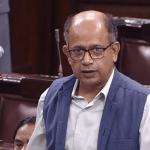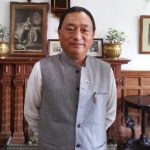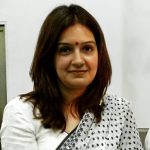Live projects for policymakers promise to be the most exciting component of the Policy in Action Program. For this edition of the program, fellows supported the work of the following policymakers:
 Dr. Patnaik is a Member of Parliament representing Odisha in the Rajya Sabha and a member of the Biju Janata Dal (BJD).
Dr. Patnaik is a Member of Parliament representing Odisha in the Rajya Sabha and a member of the Biju Janata Dal (BJD).
He graduated from St. Stephen’s College, Delhi in 1987 and later pursued a master's degree in Public Management from the Lee Kuan Yew School of Public Policy, Singapore and the John F. Kennedy School of Government at Harvard University. He holds an inter-disciplinary doctorate from the Xavier Institute of Management, Bhubaneswar.
Dr. Patnaik joined the Indian Civil Services in 1990 under its Indian Audit and Accounts Services and served as the Principal Accountant General (PAG) in Odisha, Kerala and West Bengal under the Comptroller and Auditor General of India. He opted for voluntary retirement nine years before completion of his service and joined the BJD. He currently heads its IT-Wing and is also a spokesperson of the party.
 Mr. Derek O’Brien is a Member of Parliament in Rajya Sabha from West Bengal, serving as the leader of the Trinamool Congress Party in his second term. He is currently also the chief national spokesperson of Trinamool.
Mr. Derek O’Brien is a Member of Parliament in Rajya Sabha from West Bengal, serving as the leader of the Trinamool Congress Party in his second term. He is currently also the chief national spokesperson of Trinamool.
Popular for hosting the Bournvita Quiz contest, Mr. O’Brien won the Indian Television Academy award for the best host for three consecutive years, from 2003-05. He entered the sphere of public service in 2004, after joining the Trinamool Congress Party. Since his election to the Rajya Sabha in 2011, he has served as the Chairman of the Department-related Parliamentary Standing Committee on Transport, Tourism and Culture from 2017 to 2019. He is currently also a part of the Joint Committee on the Personal Data Protection Bill, 2019.
An author of several books, including his best seller 'Inside Parliament: Views for the Front Row' Mr. O’Brien is an active contributor to public discourse on TV channels and national newspapers.
 Muthuvel Karunanidhi Kanimozhi is an Indian politician, poet and journalist. She represents the Thoothukudi constituency of Tamil Nadu in the Lok Sabha, and is a member of the Indian Dravida Munnetra Kazhagam (DMK) political party, where she functions as the chief of the DMK’s wing for Art, Literature and Rationalism.
Muthuvel Karunanidhi Kanimozhi is an Indian politician, poet and journalist. She represents the Thoothukudi constituency of Tamil Nadu in the Lok Sabha, and is a member of the Indian Dravida Munnetra Kazhagam (DMK) political party, where she functions as the chief of the DMK’s wing for Art, Literature and Rationalism.
She has an MA in Economics from the Ethiraj College in Chennai. Prior to her entry into politics, she was the sub-editor for The Hindu, as well as the editor-in-charge of the Tamil publication Kungumam, and a features editor for a Singapore-based Tamil newspaper called Tamil Murasu.
Ms. Kanimozhi has been known to champion pan-Tamil issues, and is keenly involved in cultural revitalization activities. She is one of the founders of Chennai Sangamam - a yearly festival that features traditional and folk arts from across Tamil Nadu. She also champions women empowerment programs, and is keenly interested in the welfare of differently abled and transgender people.
 Mr. Ering is a Member of the Legislative Assembly from the Pasighat West constituency in the East Siang district of Arunachal Pradesh. Until recently, he represented Arunachal in the Lok Sabha. He was also the Union Minister of State for Minority Affairs in the UPA government. He is a member of the Indian National Congress.
Mr. Ering is a Member of the Legislative Assembly from the Pasighat West constituency in the East Siang district of Arunachal Pradesh. Until recently, he represented Arunachal in the Lok Sabha. He was also the Union Minister of State for Minority Affairs in the UPA government. He is a member of the Indian National Congress.
He began his political career as a member of the Arunachal Pradesh Legislative Assembly in 1989, where he served two terms. He has also served as a Minister of State in the Government of Arunachal Pradesh and as the Deputy Speaker of the Arunachal Pradesh Legislative Assembly.
While in Parliament, he was a member of the Committee on Ethics, the Standing Committee on Science & Technology, and the Standing Committee on Environment & Forests. He has also been associated with not-for-profits working in the sphere of health and sanitation.
 Ms. Chaturvedi is a Member of Parliament representing Maharashtra in the Rajya Sabha. She is a member of the Shiv Sena.
Ms. Chaturvedi is a Member of Parliament representing Maharashtra in the Rajya Sabha. She is a member of the Shiv Sena.
She started her career as Director of MPower Consultants, a Media, PR and event management company and has previously been a columnist for Tehelka, Daily News and Analysis, and Firstpost. As a trustee of two NGOs, she works to promote children's education, women's empowerment and health.
Before joining the Shiv Sena, she was a member of the Indian National Congress and has also held the post of General Secretary of the Indian Youth Congress from North-West Mumbai. She graduated in Commerce from the Narsee Monjee College of Commerce and Economics in 1999.
 Until recently, Prof. M V Rajeev Gowda was a Member of the Rajya Sabha from the state of Karnataka. He is a national spokesperson for the Indian National Congress and the Chairman of the "Congress Research Department". He was Professor of Economics and Social Sciences and the Chairperson of the Centre for Public Policy at the Indian Institute of Management (IIM), Bengaluru and taught a range of courses. He has served as a Director of the Central Board, Reserve Bank of India.
Until recently, Prof. M V Rajeev Gowda was a Member of the Rajya Sabha from the state of Karnataka. He is a national spokesperson for the Indian National Congress and the Chairman of the "Congress Research Department". He was Professor of Economics and Social Sciences and the Chairperson of the Centre for Public Policy at the Indian Institute of Management (IIM), Bengaluru and taught a range of courses. He has served as a Director of the Central Board, Reserve Bank of India.
Prof. Gowda studied economics and political science at St. Joseph's College where he was elected as the Vice-President of the Student Union in 1982–83. He was awarded the Bangalore University gold medal in political science and secured a fully funded scholarship to pursue Masters in Economics at Fordham University, New York. Prof. Gowda holds a PhD in Public Policy & Management from Wharton School, University of Pennsylvania. He was also a Post-Doctoral Fellow in Law & Economics from University of Berkeley, California.
Prof. Gowda leads ‘Bengaluru Needs You’ (BNY), a citizen movement to involve and empower people to engage with civic authorities to bring positive transformation in the city of Bengaluru.
 Dr. Jaiswal is a three-time Member of Parliament (Lok Sabha) from the Paschim Champaran constituency in Bihar. He currently serves as the party president of Bihar BJP.
Dr. Jaiswal is a three-time Member of Parliament (Lok Sabha) from the Paschim Champaran constituency in Bihar. He currently serves as the party president of Bihar BJP.
He completed his MBBS from Patna Medical College and MD from Darbhanga Medical College in Patna. He is a member of the Governing Body of AIIMS, Patna and the Central Council of Health and Family Welfare. Previously, he has also been a member of the governing body of JIPMER, Puducherry. He takes keen interest in organizing medical camps for people below the poverty line, especially those belonging to disadvantaged communities.
In Parliament, Dr. Jaiswal is the Chairperson of the Standing Committee on Water Resources. He is also a member of the Joint Committee on the Personal Data Protection Bill, 2019.
Live Projects
During the course of the program, teams of 4-6 fellows each are assigned to work on policy issues for the participating policymakers. You’ll find below a list of the specific issues that the teams worked on during this edition of the program.
After the mass internal migration that the country witnessed during the lockdown, the government is keen on building a national database of migrant workers, especially those working in the informal sector.
- Conceptualize an effective way for the government to build such a database, minimizing inclusion/exclusion errors. What existing proxies/datasets can the government piggyback on and what additional types of data the government could collect/monitor?
- How can the database be designed in a dynamic manner that tracks the status of the workers and utilizes this information to extend social security benefits to migrant workers?
- What are some potential challenges in building such a database and possible solutions to overcome them? Are there any lessons that may be drawn from other developing countries with large informal workforces? Pay special attention to the exclusion/inclusion errors that might creep in.
- Suggest suitable recommendations on how this database could be further used by the government in formulating policies for the well-being of migrant workers.
- Study the economic impact of the COVID-19 outbreak on the state of Odisha. Identify industries/sectors and cohorts of individuals most affected by the COVID crisis.
- What policy measures have been implemented by the state and the centre to counter the effects of the pandemic in Odisha, particularly pertaining to the sectors and cohorts identified above. Critically assess the (likely) impact of these policies with respect to employment, especially in the informal sector. Are there any shortcomings in policy design and/or implementation? How might these be addressed?
- Identify potential ways in the short and the long term through which the state and central government can intervene in Odisha to minimize the damage to its economy. Make suitable recommendations for the government.
- In the context of total transfers by the Union to the States, which include grants and devolution of taxes, examine the trends in payments made to States over the last decade. Evaluate how these transfers have changed with the enactment of the GST regime.
- Has the change in transfers affected states adversely? In particular, what has been the impact on West Bengal? Evaluate the various measures adopted by different states to meet their expenditure requirements and assess their potential long term impact on state economies.
- Based on your analysis, comment on whether the current regime of tax devolution is appropriate to maintain sustainable fiscal deficits at the state level and recommend measures to mitigate identified risks. How do the recommendations of the 15th Finance Commission align with your analysis?
- Identify the broad trends in revenue earned and expenditure incurred by the Indian Railways over the past decade. What are some of the top heads of revenue and expenditure for the railways during this period?
- For large states in India, including West Bengal, identify the state-wise railways allocation in the past decade. Also provide a break-up for state-wise allocation on specific projects with respect to railway modernisation, manufacturing rail coaches, electrification, new lines construction etc.
- Keeping passenger and freight traffic demand projections in mind, critically analyse the state-wise allocations to determine if they are sufficient. Especially review allocations for and the progress of the East West and the East Coast Dedicated Freight Corridor (DFC) in this context.
- Briefly analyse factors that inhibit railway infrastructural development in West Bengal, taking cue from priorities laid out in the National Rail Plan 2030. Suggest appropriate measures to overcome these impediments with reference to related economic and political challenges.
- Map the landscape of laws/policies/interventions by the union government in connection with adoption while covering themes such as a) procedures and criteria for adoption, b) care and protection of children c) accountability of institutions facilitating adoption. Examine in detail the issues faced by prospective parents in adopting children, as well as problems faced in rehabilitation of children.
- Through secondary research and stakeholder discussions, critically examine the efficacy of the Juvenile Justice (Care and Protection of Children) Act 2015 (and the recently proposed amendments to it) in relation to the sub-themes identified above. Among other things, this act streamlined the procedure for adoption of orphans, abandoned or surrendered children.
- Undertake a comparative analysis to identify best practices in adoption from other countries and prepare a set of recommendations for India.
- Basis the above, draft an opinion piece to advocate for policy changes to strengthen the process of adoption in India - a process that is just and in tune with the times.
- Map the impact of the pandemic on the economy of North-East states in India, with a special focus on Arunachal Pradesh. How has the pandemic impacted different sectors and demographic groups in the region?
- Study key measures undertaken by the union government/state governments to arrest the economic slowdown and support communities. Are the schemes adequately funded and well implemented?
- Examine successful measures taken by other comparable regions and/or states in India as a response to the pandemic and critically assess the possibility of undertaking similar measures in the North-East region.
- Basis the above analysis, make suitable policy recommendations.
- Identify the major ongoing and planned infrastructure projects in the North-east region and their current status in terms of progress and completion. Understand how these projects seek to bolster the region’s economy.
- Undertake a detailed analysis of the central and state government’s flagship schemes/policies and proposals for improving infrastructure in the North-East, especially in areas close to the border. Conduct a study of budgetary allocations to these schemes/interventions while assessing the utilisation of funds to understand the efficacy and impact of the identified interventions.
- Are there lessons to be learnt from similar contexts in other states?
- Basis the above analysis, draft recommendations for the state and central government.
- Given the recent debates around the regulation of Big Tech in countries around the world, examine the concentration of market power in tech companies in India and the potential impact of such concentration on different sectors of the economy.
- Examine whether the Indian competition law, as it stands currently, is well equipped to deal with the regulation of the tech industry? Cite specific cases/ complaints to substantiate your position.
- How are other countries dealing with the emerging issues? Is antitrust legislation being re-looked at to regulate competition in the tech industry? How effective are the (proposed) changes likely to be?
- Based on your analysis, make suitable recommendations to prevent concentration of power in the tech industry in India and to manage possible risks that may emerge from such concentration.
- Examine the potential of urban planning to create inclusive spaces for women such that it enhances livelihood options, improves safety and the general standard of living for women.
- Mumbai has recently come up with an urban plan with a gender-specific focus. Study this plan in detail and evaluate if such an exercise can be replicated in other cities, especially smaller cities? What challenges do you foresee?
- Identify best practices from around the world where gender responsiveness has been incorporated into city design and has had the desired effect. Examine the possibility of incorporating some of these practices in the Indian context.
- Recommend ways in which the central government can incentivise state and city governments to build gender responsiveness in planning. Are there any existing schemes/policies that have this stated objective? How effective have these interventions been and what changes would you recommend?
- Under which rules do police invoke internet shutdowns in India? Study the relevant laws and procedures for ordering internet shutdowns in India and briefly delineate the same. These regulations may include S.144 CrPC, Indian Telegraph Act, Temporary Suspension of Telecom Services (Public Emergency or Public Safety) Rules, 2017 etc.
- Provide a brief background on the use of this power in India, including specific situations in which the power has been used. What can be some alternatives for law enforcement, especially in riot situations?
- Study internet shutdown procedures used in other global jurisdictions and compare the same with India in terms of judicial oversight, grievance redressal and actual usage of the power by the executive.
- Through the above mentioned study, suggest measures/amendments to the law to ensure that the procedure for internet shutdowns is fair to all stakeholders involved.
- Assess the broad impact of the pandemic on women's participation in the workforce. Identify the broad trends in women's employment in the formal and informal workforce by age group, urban-rural population, nature of work etc., pre and post COVID.
- Analyse the female labour force participation trends in Karnataka to draw a comparison with other states and identify the key factors which affected women's access to jobs, pre-COVID. Study this alongside the added barriers to work during the pandemic, to understand why fewer women seem to be returning to work than men.
- Compare the various efforts initiated at the central and state levels to improve women’s access to economic opportunities. Based on these analyses, and identification of the types of work which have seen increased participation among women since the pandemic, suggest policy and programme measures that can be undertaken at the central and state level to increase workforce participation among women, especially in the context of Karnataka.
- Develop a profile of the tourism industry in Bihar by analyzing the State’s tourism assets, the inbound tourist footfall by region/circuit and the contribution of tourism to Bihar’s economy.
- Basis the above, examine the potential for the growth of the tourism industry in the State, specifically in historically significant places. Consider analysing the structural issues that may hinder the growth of the sector as well as shortcomings in existing state and central government policies.
- Survey policies, laws, and best practices of other states and countries to promote tourism. Examine their applicability in Bihar keeping in mind the state’s geography, socio-economic factors, level of development and other such factors.
- Basis the above, propose suitable policy recommendations, substantiated by solid reasoning, to boost tourism in Bihar.
Class profile
Educational background